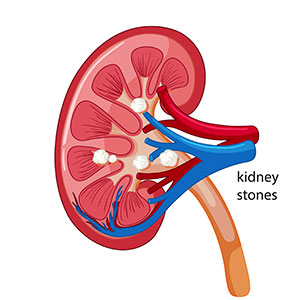Imagine you're going about your day when, out of nowhere, an unexpected and excruciating pain strikes – that's what dealing with kidney stones can feel like. But what's even more intriguing is that the experience can be remarkably different between men and women.
In this blog, Dr. Ashit Shah delves into the curious world of kidney stones, where gender can make all the difference when it comes to symptoms. Get ready for a journey of discovery, as we uncover the distinctive ways these tiny intruders wreak havoc on men and women.
What Are Kidney Stones?
Kidney stones, scientifically known as renal calculi, are solid masses made up of various minerals and salts. These stones develop within the kidneys when there is an imbalance in the substances that constitute urine. There are different types of kidney stones, with the most common being calcium oxalate stones.
Calcium oxalate stones typically form when there's an imbalance in the urinary composition, marked by reduced citrate levels and elevated concentrations of calcium, alongside either oxalate or uric acid. These stones are often associated with diets rich in oxalate, a naturally occurring substance found in both plant and animal sources. Factors contributing to kidney stone formation include diet, genetics, and hydration levels.

To understand how gender might influence kidney stone symptoms, we must consider the prevalence of this condition among men and women.
Prevalence in Men and Women
Kidney stones do not discriminate when it comes to gender; they can affect both men and women. However, studies show that men are more likely to develop kidney stones than women, with a nearly double prevalence rate. Men might be more prone to uric acid stones, one of the types of kidney stones related to diet and genetics.
Age also plays a role in kidney stone development. While these painful stones can form at any age, individuals between the ages of 30 and 60 are more susceptible. Beyond gender and age, several risk factors come into play. Men are more prone to certain factors like obesity and diets high in protein and sodium. In contrast, women might experience kidney stones due to conditions like obesity and urinary tract infections (UTIs).
Now that we've set the stage, let's explore the symptoms of kidney stones that are common to both men and women.
Common Symptoms in Both Genders
Both men and women who develop kidney stones often experience a set of shared symptoms. These symptoms include:
- Flank Pain: A hallmark of kidney stone pain, flank pain usually occurs on one side of the lower back and can be excruciating.
- Pain radiates to the groin region: Often people with kidney stones feel pain in the groin region.
- Frequent Urge to Pass Urine: Sometimes accompanied by pain or a burning sensation.
- Nausea and Vomiting: Fever, and blood in urine accompanied by nausea and vomiting are common signs of kidney stones.
These symptoms primarily result from the movement of kidney stones through the urinary tract and their potential obstruction of urine flow. However, there are unique symptoms that can be more prevalent in each gender.
Unique Symptoms in Men
Men experiencing kidney stones might encounter symptoms that are less common in women, including:
- Testicular Pain: Some men report aching or pain in the testicles, often as a result of the stone's proximity to the testicular area.
- Groin Pain: Kidney stones can cause referred pain in the groin, making it particularly uncomfortable for men.
These unique symptoms can be attributed to the anatomical differences between men and women. But what about women? Do they experience their own set of distinctive symptoms?
Unique Symptoms in Women
Indeed, women may have a different experience with kidney stones. Some unique symptoms or complications they may encounter include:
- Urinary Tract Infections (UTIs): Kidney stones can increase the risk of UTIs in women. The blockage and irritation caused by the stone can provide an ideal environment for bacterial growth.
- Pelvic Pain: Kidney stones can sometimes lead to pelvic pain in women, which may be mistaken for gynaecological issues.
These gender-specific symptoms are often associated with the female anatomy and physiology. Now that we've covered the symptoms, it's essential to address the diagnostic considerations and potential challenges.
Despite the gender differences, it is essential to understand that family history can also be a contributing factor for kidney stone development in both men and women, as genetic predisposition can play a role in stone formation. The risk of kidney stones increases if you have a family history of the same.
Diagnostic Considerations
The unique symptoms experienced by men and women can sometimes lead to delayed diagnosis or even misdiagnosis. For example, women with kidney stones might mistakenly attribute pelvic pain to gynaecological issues, while men could dismiss testicular or groin pain as unrelated discomfort.
This highlights the importance of healthcare providers conducting a thorough evaluation when kidney stones are suspected. A comprehensive medical history, physical examination, and diagnostic tests like imaging studies (CT scans or ultrasounds) can help ensure an accurate diagnosis.
Coping with Kidney Stone Symptoms
The pain and discomfort associated with kidney stones can be excruciating. Regardless of gender, there are strategies to manage symptoms:
- Pain Management: Over-the-counter pain relievers, prescription medications, and, in some cases, intravenous pain management can help alleviate discomfort. It is better to take an analgesic painkiller after a doctor's advice.
- Stay Hydrated: Adequate hydration is crucial. Drinking plenty of water can aid in flushing out smaller stones and prevent new ones from forming.
Prevention Strategies for All Genders
While managing symptoms is crucial, prevention is always the best approach. Here are some universal strategies for preventing kidney stones:
- Dietary Changes: Reducing the consumption of high-oxalate foods, sodium(salt), and animal proteins can lower the risk of stone formation.
- Increased Water Intake: Staying well-hydrated is essential, as it dilutes urine. It promotes the easy flow of urine and thereby prevents the accumulation of minerals. Accumulation of minerals can lead to kidney stone formation.
- Lifestyle Modifications: Maintaining a healthy weight, and incorporating regular physical activity into your routine can also help prevent kidney stones.
- Avoid Hot and Humid Conditions: It is better to avoid hot and humid conditions if you wish to prevent kidney stones.
Seeking Medical Help
Regardless of your gender, if you suspect kidney stones, it's crucial to seek medical attention promptly. Early diagnosis and treatment can lead to better outcomes, reduce discomfort, and help prevent complications like kidney damage. Kidney stones can be managed effectively, and your healthcare provider can guide you through the appropriate treatment options.
While kidney stones can affect both men and women, the way they manifest can vary significantly due to anatomy. Common symptoms like flank pain, back pain, and urinary urge are shared experiences, but men may experience testicular and groin pain, while women might contend with UTIs and pelvic discomfort.
In the face of these gender-specific symptoms, it's essential to prioritize early diagnosis, pain management, and prevention strategies that apply to all. Kidney stones can be painful, but with the right knowledge and proactive steps, you can reduce the impact of these tiny, troublesome crystals on your life. Stay informed, seek medical advice when needed, and take control of your kidney health.



